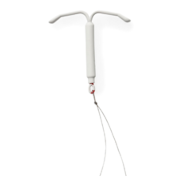Can an IUD improve your sex life?
The IUD is a low-maintenance way to prevent pregnancy—but new research suggests it might have perks for your sex life too.

We already know that IUDs are really good at preventing pregnancy. But are they good for your sex life? New evidence suggests that, for many people, IUDs have the potential to improve “sexual well-being.” Sexual well-being involves being able to avoid negative sexual things such as violence or unwanted pregnancy, but it also involves more positive things such as feeling good about your sexuality and having happy, healthy sexual relationships.
How might IUDs affect sexual well-being?
Given that sexuality is so darn complex, there are lots of ways that birth control could affect people’s sex lives and sense of sexual well-being. My research colleagues and I recently interviewed 50 women ages 18 - 29 to get their perspectives on how IUDs might affect sexuality.
No surprise: the women we interviewed—some of whom had used IUDs and some of whom hadn’t—reported a variety of ideas and experiences. But there were some common themes:
1. Security. For many participants, there were sexual benefits of feeling extremely protected against unwanted pregnancy. These women talked about how, with the IUD, you don’t have to worry about “that little voice inside your head"—the voice that asks questions like: "Will my period be late this month?” “Am I pregnant?” “Did I really take my pill on time each day?” Some said an IUD could allow them to enjoy sex more without worrying about pregnancy.
2. Spontaneity. Some participants talked about IUDs allowing for more spontaneous sex, particularly compared to methods you have to use in the heat of the moment like condoms and withdrawal. The women we interviewed emphasized the importance of using condoms to prevent sexually transmitted infections (STIs), but they also had used condoms for pregnancy prevention (either as a back-up or primary method).
While condoms work great for many couples, some dislike how they affect sex and prefer not to use them. For example, one woman said she and her partner had used the pill as their primary birth control, but they sometimes used condoms for additional protection—particularly if she had missed a pill. Once she started using the IUD, she said they no longer felt like they had to use a condom for back-up protection, and their sex life improved as a result.
3. Hormones. IUDs’ low or no hormones meant good things for the libidos of some of the women we interviewed. A small but significant group said the pill could lower libido. In comparison, an IUD could have a more positive effect on interest in sex.
But what about the string?
We were surprised by just how many women in our study were worried about the IUD string—specifically about whether the string would poke a partner’s penis. If you’ve ever worried about this, you’re in good company!
Those who had actually used an IUD were much less likely to report this phenomenon, so secondhand stories about IUD string issues were much more common than personal experiences. It was reassuring to hear that despite all the stories, the strings were rarely an actual problem for the folks in our study. (Pro tip: If the string is a concern for you, ask your provider to leave the strings long and coil them around the cervix.)
Any other takeaways?
Some of the study participants experienced increases in bleeding and cramping while using an IUD, especially the non-hormonal IUD, Paragard. These changes can be a big turn-off—both generally and in terms of sex. Don’t lose hope: most heavy bleeding and cramping will subside after several months. It’s also possible to manage troublesome bleeding with common, over-the-counter drugs like ibuprofen. (Talk to your provider for more info.) If this is a deal-breaker, consider a hormonal IUD. Some women using IUDs with levonorgestrel (Mirena, Skyla, Liletta) have no menstrual bleeding or cramping, which can be great for one’s sex life.
Now we’re working on a study with a bigger group of folks who have just started using an IUD. We’re tracking them over time to see how their sexual well-being changes, if at all. Early results suggest that a large group (40%) experienced improvements to their sexual well-being as a result of their IUD. About 13% experienced sexual down sides—almost all of which were related to increased bleeding and cramping.
To me, the take home message is that sexual pleasure can be an important factor in choosing a birth control method. You’re the only one who can say how your method and pleasure might be related—so trust yourself and keep exploring until you find a method that’s a good fit for you.
How do you feel about this article?

Heat up your weekends with our best sex tips and so much more.
